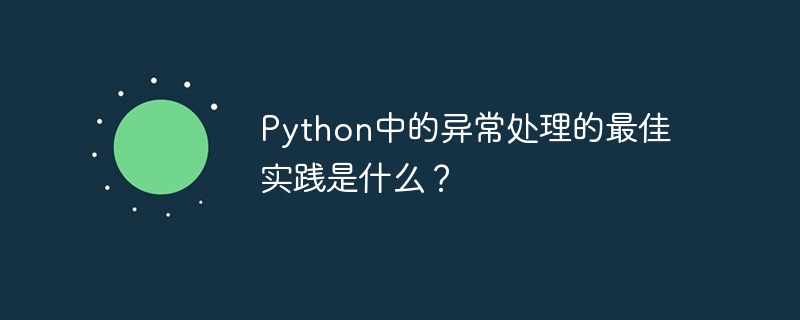

What are the best practices for exception handling in Python?
Exception handling is a very important technology in computer programming. It can help us prevent and handle errors and exceptions that occur when the program is running. In Python, exception handling is implemented through the try-except statement. In this article, we will discuss some best practices for exception handling in Python and provide some concrete code examples.
try:
file = open("example.txt", "r")
content = file.read()
file.close()
except FileNotFoundError:
print("文件不存在!")In the above example, we use the FileNotFoundError exception type to catch the file does not exist error. If the file exists, the code will execute normally; if the file does not exist, the program will output "File does not exist!".
try:
num = int(input("请输入一个整数:"))
result = 10 / num
print("结果为:", result)
except ZeroDivisionError:
print("除数不能为零!")
except ValueError:
print("输入不是有效的整数!")In the above example, we use the ZeroDivisionError exception type to catch the error of dividing by zero and the ValueError exception type to catch the error of the input not being a valid integer. If the user input is a valid integer and is not zero, the program will perform the division operation and output the result; otherwise, the program will output the corresponding error message.
try:
file = open("example.txt", "r")
content = file.read()
print(content)
except FileNotFoundError:
print("文件不存在!")
finally:
file.close()In the above example, the file object will be closed regardless of whether the file exists or not. If the file exists, the program will read the file contents and print them; if the file does not exist, the program will output "File does not exist!".
In addition to the best practices mentioned above, there are some other exception handling techniques that can help us write more robust code. For example, you can use the else statement to handle the situation where no exception occurs in the try code block; you can also use a custom exception class to improve the readability and maintainability of the code.
To summarize, the best practices for exception handling in Python are: use the required exception type to catch specific errors and exceptions; use multiple except statements to catch more than one exception type; use the finally statement to ensure that certain code is always executed. I hope the code examples provided in this article can help you better understand and apply exception handling techniques.
The above is the detailed content of What are the best practices for exception handling in Python?. For more information, please follow other related articles on the PHP Chinese website!




